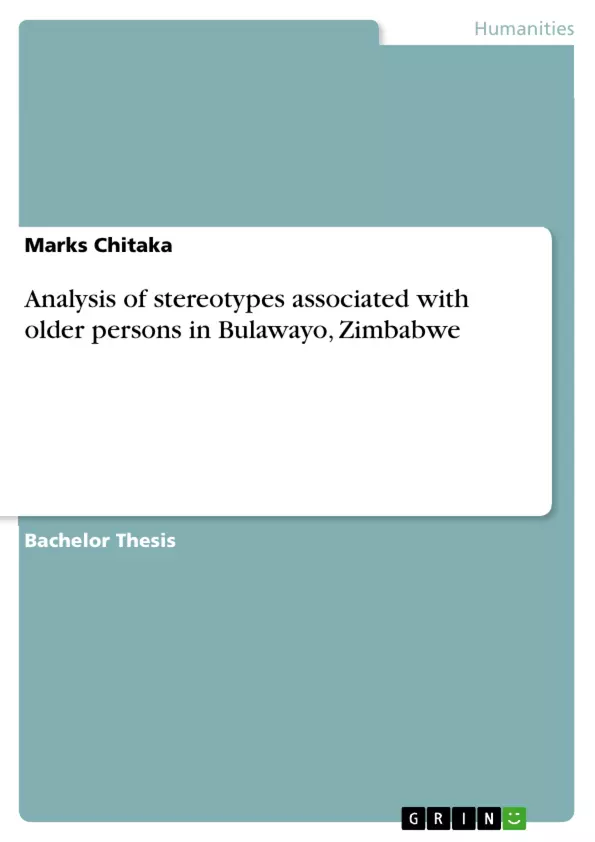The purpose of this research was to critically analyze some of the stereotypes that affect older persons and expose all the damaging myths that are associated with old age. The selected negative stereotypes will be looked at in a view to create a positive attitude towards late adulthood within society. It is important to examine the prevailing stereotypes regarding older persons. Although some of these are positive and others negative, the former tend to be in the minority.
The negative stereotypes give rise to ageism, a process of systematic stereotyping and discrimination against people because they are old, just as racism and sexism can accomplish with skin colour and gender. It allows the younger generations to see older people as different from themselves and as a result cease to see their elders as human beings. It is the reason why many people find it difficult to deal with growing old and put off coming to terms with retirement, which marks the entry into late adulthood.
The popular view of old people is that they are incompetent. Age is considered as a handicap. The aged are made to feel that they are a burden to those around them. In the business world they are forced to retire and make way for younger men and women or are given some minor niche in the company hierarchy where their advice can be conveniently ignored. Most of these attitudes are rooted in the stereotypes that society holds about old age.This research project will analysis the basis of these stereotypes.
Inhaltsverzeichnis (Table of Contents)
- CHAPTER I
- INTRODUCTION
- Background of Study
- Statement of the Problem
- Purpose of the Study
- Objectives of the Study
- Significance of the Study
- Assumptions of the Study
- Delimitations of the Study
- Limitations of the Study
- Definition of Terms
- Conclusion
- CHAPTER II
- REVIEW OF RELATED LITERATURE
- Introduction
- Stereotyping
- Stereotyping of Older persons as unproductive
- Stereotyping of Older persons as sexually in-active
- Stereotyping of Old people as lonely, isolated and depressed
- Stereotypes of Older persons as unable to learn and remember new skills
Zielsetzung und Themenschwerpunkte (Objectives and Key Themes)
This research aims to analyze stereotypes associated with older persons in Bulawayo urban, Zimbabwe, exploring the impact of these stereotypes on the lives of older adults. The study utilizes questionnaires and interviews to gather data from a sample of 30 participants.
- The prevalence and nature of stereotypes about older persons in Bulawayo urban
- The impact of these stereotypes on the lives of older persons
- The perceptions of older persons themselves regarding these stereotypes
- The role of societal norms and cultural beliefs in shaping these stereotypes
- The potential for challenging and changing negative stereotypes about aging
Zusammenfassung der Kapitel (Chapter Summaries)
Chapter I: Introduction
This chapter provides an overview of the research, setting the context by outlining the background of the study, the research problem, the purpose and objectives, and the significance of the study. It also includes the assumptions, delimitations, limitations, and definitions of terms used in the research.
Chapter II: Review of Related Literature
This chapter presents a comprehensive review of existing literature on stereotyping, particularly focusing on stereotypes associated with older persons. It examines various aspects of these stereotypes, including their prevalence, impact, and potential consequences.
Schlüsselwörter (Keywords)
The key themes and concepts explored in this research include: older persons, stereotypes, aging, ageism, social perceptions, cultural beliefs, social norms, impact on well-being, self-fulfilling prophecy, and challenges to stereotypes.
Frequently Asked Questions
What is ageism?
Ageism is the systematic stereotyping and discrimination against people because they are old, similar to how racism or sexism functions.
What are common negative stereotypes about older persons?
Older people are often wrongly viewed as incompetent, unproductive, sexually inactive, lonely, or unable to learn new skills.
How do stereotypes affect the professional lives of older adults?
In the business world, they may be forced into early retirement or given minor roles where their experience and advice are ignored.
What is the impact of these myths on society's view of aging?
Negative stereotypes cause younger generations to see older people as different from themselves, making it harder for everyone to come to terms with growing old.
Can stereotypes about aging be positive?
While some stereotypes are positive, the research indicates that negative myths are far more prevalent and damaging to the well-being of older persons.
- Citation du texte
- Marks Chitaka (Auteur), 2008, Analysis of stereotypes associated with older persons in Bulawayo, Zimbabwe, Munich, GRIN Verlag, https://www.grin.com/document/333940



